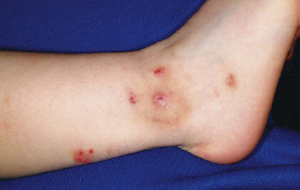What is - Insect Bites and Papular Urticaria
Mosquitoes can also spread diseases, such as dengue and malaria. Sand fly bites may occur in sandy areas e.g. beach.
Mosquitoes are attracted to bright clothing, heat and human smells, particularly those of young children.
Children with atopic dermatitis tend to attract insects more than other children and tend to have a more severe reaction.
Papular urticaria is caused by over-sensitivity to a variety of insect bites, especially those of mosquitoes, fleas, bed bugs and mites. It can sometimes occur one or two days after the initial bite.
Symptoms of Insect Bites and Papular Urticaria

Patients with papular urticaria complain of itchy, red, round bumps or wheals, usually on the exposed sites of the body (eg. legs, arms and face). Often the bumps may appear in groups or in a row. Recurrent episodes are common, especially if there is continued exposure to the insects.
In both insect bites and papular urticaria, scratching can result in open, oozy, infected wounds.
After healing, a dark spot (post-inflammatory hyperpigmentation) may appear and last for several months.
Insect Bites and Papular Urticaria - How to prevent
Treatment for Insect Bites and Papular Urticaria
Treatment of papular urticaria includes oral antihistamines (anti-itch) medications and topical steroid creams. Sometimes, if severe, a short course of oral steroids may be required to decrease the severe itch.
The information provided is not intended as medical advice. Terms of use. Information provided by SingHealth.
Our Medical Specialists
1
2
3
4
5
Health Articles



















